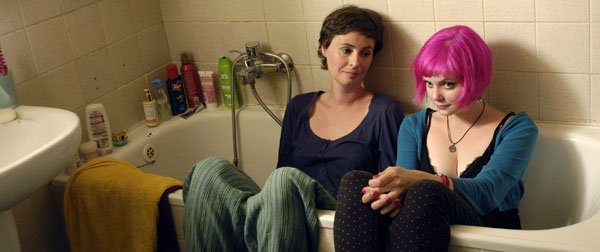|
Reviews of Recent Independent, Foreign, & Documentary Films in Theaters and DVD/Home Video

KAWASAKI’S ROSE
In his new film, director Jan Hrebejk (Beauty in Trouble) takes a lot of convoluted detours to reach a moving and affirming truth, laced with some needed ambiguity. The first third lays out one elaborate ambush. Pavel (Martin Huba), an eminent Czech psychiatry professor, has been named the recipient of an award for his political stance against the former totalitarian regime. The name of the prize—the Memory of the Nation. Luckily, not everything is so spelled out here. A documentary TV crew follows the award winner over several days as he teaches, rides horseback, and chops wood. In one of the script’s odd and conspicuous coincidences, the crew’s sound man is Pavel’s son-in-law, the resentful Ludek (Milan Mikulcik). Behind Pavel’s back, he mocks his father-in-law’s self-effacing plea not to be placed on a pedestal. Within the first 10 minutes, we discover that Ludek’s been having an affair with a reporter-colleague while his wife, Lucie (Lenka Vlasakova), has been hospitalized with a mysterious illness so rare that she’s only the third reported case in the world. The film almost becomes sidelined by the bedroom entanglements before Ludek gets his hands on what he believes is a smoking gun, which could strip bare Pavel’s past during the Communist era. However, before the troublesome Ludek pretty much disappears from the film, there’s a huge disconnect between what the steadily steaming Ludek sees in Pavel and how the audience perceives the unruffled and amiable patrician. (True, Pavel’s wife is referring to her son-in-law when she says privately that “Boring people are worse than murderers,” but so what if she has high intellectual standards?) Ludek believes Pavel has stood in the way of his relationship with Lucie, but his complaints reveal more about his insecurity of his class and family background (his parents were ardent Communists) than any action committed by Pavel. Yet this discrepancy adds another layer of tension. How can Ludek possibly prove his suspicions that Pavel is less than a paragon of virtue? Kawasaki’s Rose is at least two films in one compact film—a domestic drama and a Cold War conundrum, the latter more fluid than the former. The historical/political perspective persuades more than the personal. There’s not enough time to develop the complicated relationships, especially between Pavel and daughter Lucie. And among a few other questions, what did Lucie ever see in Ludek? It’s hard to take sides when you don’t know enough about the characters. However,
the script is much more interested in examining the
residue of betrayal manifested in its many forms, and it’s to Hrbejk’s credit that
the cast remains buoyant even under so much plot. The viewer might
become overwhelmed by all of the revelations of family secrets (some are
more eyebrow raising than others), but the film retains a vitality,
especially in a change-of-tone foreign excursion, where the enigmatic
title comes in. Though screenwriter Petr Jarchovsky piles on the dialogue, he obeys the admonition from one
of his characters—gestures and
expressions reveal more than words. And for the film’s ending, it’s true
here, too.
Kent Turner
|

